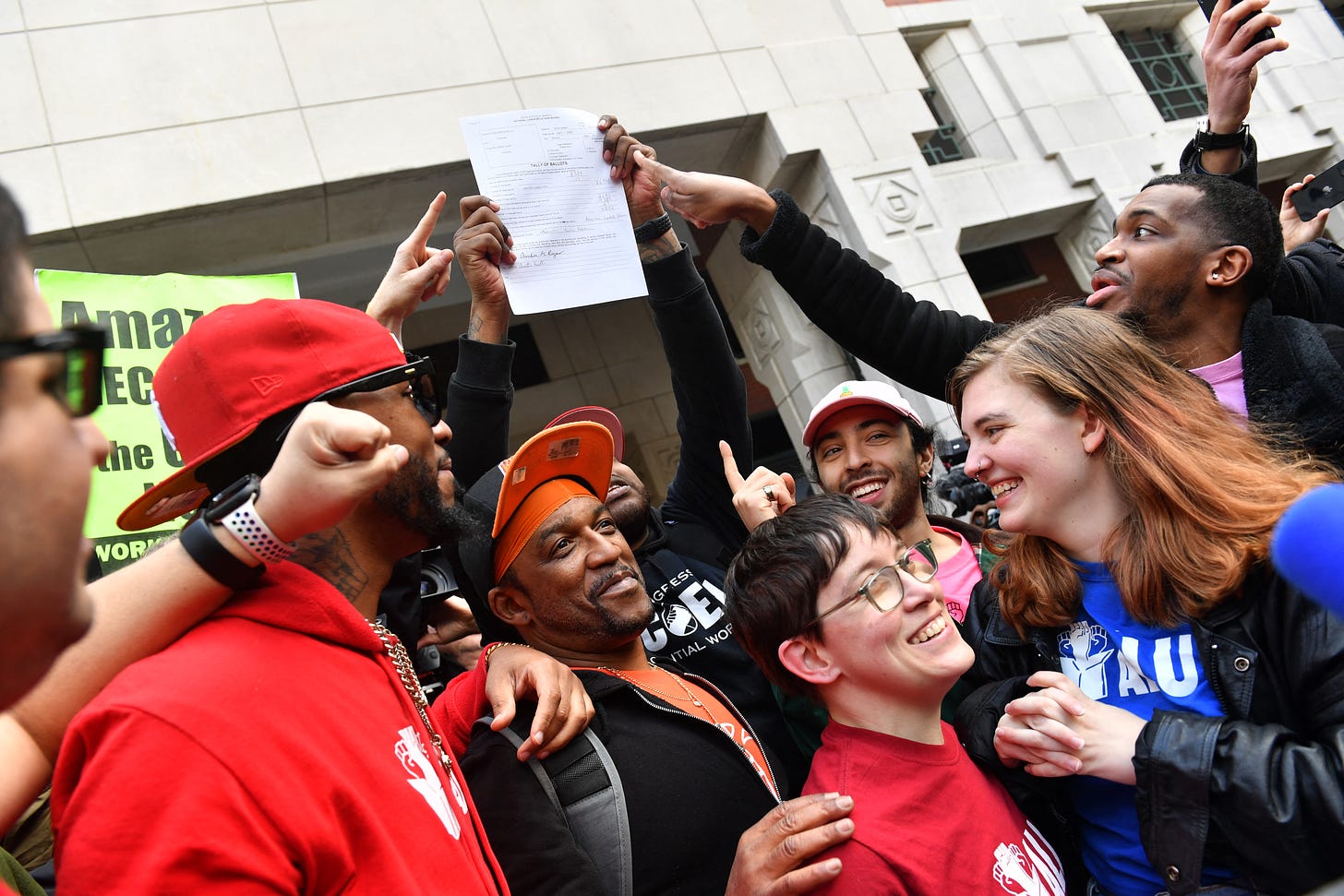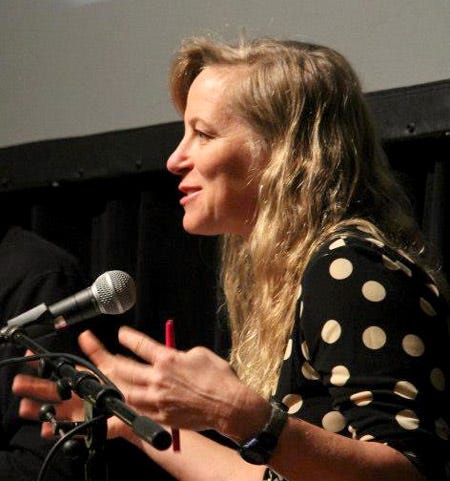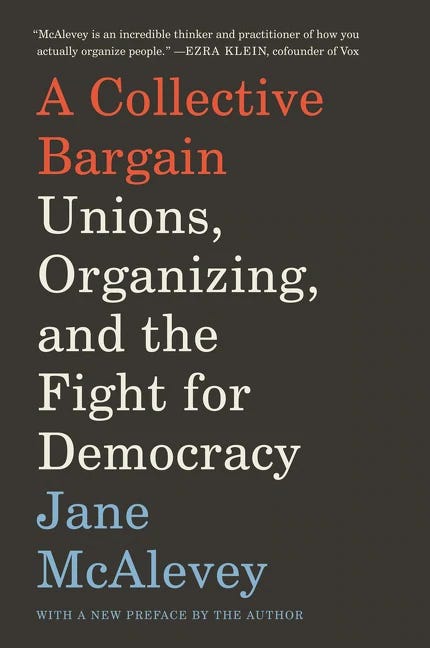Talking to veteran labor organizer Jane McAlevey about the union victory at Amazon's Staten Island warehouse and how workers can build on it
Anand Giridharadas Blog

It was the Yes heard around the world.
Earlier this month, workers at an Amazon warehouse in Staten Island faced down management in a much-watched vote to form a union. To the shock of one of the largest and most formidably anti-union companies in America, the workers won.
With little help from large, established unions, Amazon workers — led by Chris Smalls — achieved one of the greatest labor victories in a generation. The seemingly impossible feat at the JFK8 warehouse was made possible by the simple yet daunting choice by thousands not to quit, even while working conditions grew more perilous for employees by the day. That’s one of several key factors in transforming an industry built on exploiting workers, according to Jane McAlevey, a veteran labor organizer and a leading voice in the movement for years. She is the author of three books, including A Collective Bargain: Unions, Organizing, and the Fight for Democracy.
I spoke with Jane recently about the significance of the victory at Amazon, the power and ferocity of local unions relative to national ones, how the Democratic Party has failed labor, and how everyday workers can start mobilizing their workplaces today.
The long and short of my conversation with Jane: What happened on Staten Island doesn’t have to stay on Staten Island.
It’s only fitting that this interview was edited by a former organizer of MSNBC’s union, Natalie Johnson, who happens to be The Ink’s new managing editor (and who many moons ago helped me launch this newsletter). Please give her a warm welcome in this new role!
“The only way to confront the degradation of work in this country is not to quit”:
a conversation with Jane McAlevey

Out of all the companies where a union drive could happen, why does Amazon matter as a target?
Other than taking on Elon Musk, there is no one more important in terms of grotesque representation of arrogance and inequality. Amazon has a record of despicable behavior to human beings, turning human beings into robots. We know that the conditions in these plants are completely outrageous. Jeff Bezos vies for being the first- or second- richest guy in the world, depending on the day. He couldn't give a rat's ass about any human being except himself.
Taking on the corporation that has been transforming the concept of work and beating it is like winning in the auto plants in the 1930s. Taking on an employer who has set out to destroy the very concept of a meaningful workday and showing that workers can do this could not be more critical when inequality, grotesqueness, and arrogance are almost unimaginable.
You've been involved in labor organizing and thinking about labor organizing for a very long time. I'm curious what your initial reaction was to the Amazon victory.
I was surprised, joyously so. They did what we call "filing light," meaning they filed with 30 percent. It's not impossible. Filing with less than a majority isn't a great idea, though. Because of this, there are a lot of young leftists out there saying, "Screw the conventions. File light." That's not helpful because it doesn't often work. But as soon as I began to dive into the media interviews about how they did it, I realized that they had practiced some of the best methods out there.
One of the best interviews I read was with Brima Sylla, a worker from Liberia who helped bring members of the African immigrant base into a yes vote. He speaks six languages. He was a rockstar worker organizer. And what he was doing something I call "whole worker organizing." A worker is not just a worker. They have a whole life outside of work, and the connections they have outside of work can be more powerful than the connections they have at work.
There was also a worker leader running a Spanish-language WhatsApp. They were doing what I call "deep organizing," with an expansive view of how to tap into the organic connections that workers bring.
One of the revelations reported by Jodi Kantor and others at The New York Times last year was that JFK8, the Amazon facility in Staten Island, has a 150 percent annual turnover. This would seem to make it harder to organize. How does it complicate the deep, whole worker organizing approach?
It does complicate it, and I think it's by design. The brilliance of Chris Smalls and the team was understanding that they weren't going to quit their jobs. They were going to stay in their bad jobs. The only way to confront the degradation of work in this country is not to quit.
The Great Resignation is a waste because we need people to stay in their jobs and confront the destruction of a quality job. That's the power behind the decision by these Amazon workers — to stay, fight, and win. It was a very, very, very, brilliant move on their part to say, "We're not leaving. We're staying."
The Amazon workers now have what I call strategic workplace power, meaning that if they can build to a supermajority strike — even for a single day, considering the importance of Prime delivery — they can win a contract. That is very different from many other campaigns right now, where there's less strategic workplace power. There may be other forms of power. There's associational and community power if we do our work right and use it. But Amazon workers have strategic workplace power. If you can shut it down, you can do real damage to the employer.
The Amazon union's goal is to secure things like more money and better conditions on the job. Yet the awful work conditions at Amazon are not bugs in the system; they're features. It’s hard to picture what Amazon looks like if something as central as treating workers like robots were extricated from it. Given that the entire cathedral is built on mechanisms like minimal breaks and second-to-second monitoring and that high attrition, what is possible in changing the nature of the work?
For my most recent book, A Collective Bargain, I examined conditions in the auto plants in the early 1930s. I would argue that today's conditions at Amazon aren't different from what the militant, progressive, and radical workers then had to confront. They decided to stay on the job and fight to transform horrible jobs into one of our most important industries. The most exciting promise to me about this is that it seems daunting.
We can transform an industry built on destroying the quality of life. I do think that many Americans who did not understand how badly workers are abused in this country did have the veil pulled away by the pandemic. Can we build enough pressure that reveals enough disgusting behavior by the Bezoses and Musks to win over the public? Thanks to a grossly mismanaged pandemic, it seems like workers are winning the public over right now. Chris Smalls organized his first walkout over inadequate Covid protocols at the beginning of a pandemic. I think there's been a lot of public sympathy for that.
The strikes that really mattered in the 1930s were the ones that came before the National Labor Relations Act and confronted the Democratic Party. They put pressure on the party and said, "We've got to get some laws in here that are going to protect us, or we're just going to keep dying on the job." I think that's the moment we're in. It's going to take a more militant bunch of workers like the Amazon workers who are not going to accept crap.
If the Amazon workers succeed, should we expect Amazon to look different externally? Not just internally for things like working conditions and pay. Would you expect things like single-day service becoming less available? Would you expect to see Amazon having less market share and less of a monopoly?
Not necessarily. I don't think being compensated well and respected has to mean that there can't be Prime delivery. I think it will be an eight-hour day, not a 12-hour day. There's no reason you can't deliver packages in the greater New York area in a day or two and make it a humane job. I don't think one has to lead to the other. I do think consumers would still expect fast delivery, delivered in a very humane, pro-worker way.
The Amazon win is significant and may be the biggest union victory in a generation. But it does build on other surprising victories in recent years. What are some of the others you have been watching that tell you something broader may be shifting?
I would say that a lot of the "Let's get serious about organizing, making demands, and challenging the neoliberal establishment" push comes from teachers' unions. I do not mean the national ones. I mean the Los Angeles, Chicago, Oakland, Minneapolis unions who went on strike. I think the strikes that began in West Virginia in 2018 inspired some of the work that's taking place now by showing that we don't have to accept these terms and conditions. We can fight back and win.
We saw pent-up frustration in 2018. I've been trying to tell people that this is not just about essential workers getting hammered in the most disgusting, outrageous way — though it is a part of it. It predates the excitement, the militancy, and the willingness to challenge their national unions and their employers. It's been coming from very smart local unions for several years.
There is a distinction you make between local unions and national unions in terms of the boldness we're seeing. Can you explain that contrast and why that is?
I was trained as a young organizer at a militant union that understood the role of strikes and power, and that we don't win without power. I think that the local unions have adhered to the understanding that not being nice to the Democrats when they're not nice to us is essential. National union leadership is far too close to the Democratic Party. They always have been. The consultant-industrial complex goes right between the two of them. You've got all these consultants who work for the national unions who also work for the Democratic Party. There's been this idea coming out of the national unions for the last 25 years that they're too weak to win strong contracts. It led them to the wrong place, where you make corporate deals for the Democratic Party. Last I looked, this hasn't gotten the American working class very far.
When you look at these new local successes, what is working now? What's new that's being tried?
What's different, beautiful, and long overdue is a direct connection to the people they serve. And a more holistic view of what a worker’s problem is. There's a lot of attention now to the idea that we are not just fighting for good contracts from the employer. We are fighting for better schools, better healthcare, better communities, and a direct challenge to the logic of neoliberalism.
When I was young, we took on the Democratic mayor in Stamford, Connecticut, Dan Malloy, who later served as governor of the state. He was very anti-union when I was organizing nursing home workers, child care workers, and janitors in his jurisdiction.
He had been pushing a gentrification plan that was all about “revitalizing downtown.” They were coming right at all the housing the workers that we were organizing lived in. I went to the union leadership, and I said, "This housing fight is our fight." And my leadership said to me, "No, go find a community group, Jane. Let them do that. Your job is to organize the workers and win a contract."
I threatened to quit. I said, "A gigantic gentrification scheme will displace our members or future members. So how is this not our fight?" That became the Stamford Organizing Project. Even there, I was at a very progressive union, and it took me threatening to quit it to get my leadership to understand a more holistic view.
Gig workers and freelancers aren't eligible for the kind of victory we're seeing with Amazon, as improbable as that was. In the American system, are unions ever going to be the path for those kinds of workers?
No. I think the pressure has come from workers who have strategic workplace power, whether it's the public sector or the private sector with Amazon. I think that the gig worker debate is outrageous. We have to use workers who can walk off the job and create a crisis for the employer class. Then, usher in laws that will change the gig economy. To me, that's step two. The gig economy workers do not have the power to do that on their own.
If you're a worker and have problems with your job but you don't know where to start, what is the first step you would urge someone to take?
Step One is to start talking to your coworkers and do it quietly. Step Two is to meet outside of the workplace. Step Three is to decide whether you're going to do what Smalls' team did and go it alone, without help from established unions, which is pretty hard.
A lot of workers will need those outside resources to win. In my third book, I gave recommendations for "shopping for a union" and making demands of them. The Amazon Labor Union got a lawyer and had some experts they were talking to. I'm not giving those experts credit, but labor law is byzantine beyond belief. So you're going to need some advice.
If you want to form a union and you need some help doing it, the first thing you should do is say to any union that you call, "Look, before we agree to do anything with you, you need to put us in touch with some of your elected rank and file leaders in your union, not your staff. We want to have a direct dialogue with other workers in this union. We want to know from those workers, are you a democratic union? Do workers' voices matter in this union? Do we get to make the decisions in this union, or is it all top down?" And if it's top down, walk away and find another union.
Jane McAlevey has been an organizer in the labor movement for more than twenty years. She is the author of three books, including “A Collective Bargain: Unions, Organizing and the Fight for Democracy.” This interview was edited and condensed for clarity.

No comments:
Post a Comment